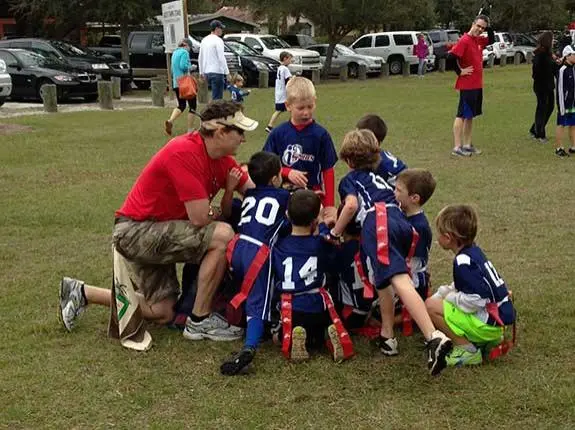Article
11 Tips For The First-Time Coach

Youth sport organizations often rely on parent volunteers to coach the league’s teams. Despite the lack of experience many of these volunteers have, without their generosity of time and spirit kids would not have the opportunity to learn and play a sport.
First-time coaches often are parent volunteers. A typical scenario has mom or dad registering a young child in a youth sports organization, which then asks parents to volunteer. The parent might consider him or herself capable of being an assistant coach, and then all of a sudden is named a head coach! Many first-time coaches find this role harder than they expected, so here are concrete tips to ease matters and help your youth athletes.
1) Let your child know you’re considering coaching.
Explain that you’re really looking forward to this, and ask for feedback about it. Your child’s opinion may or may not change your decision about coaching, but it’s good to have your child in on this new role you’ll be playing from the beginning.
2) Be clear on your own goals for coaching.
Coaches of kids just starting to play a sport may have the simple goal of a season enjoyable enough that everyone returns for next season.
3) Share your goals with your players and their parents from the start.
Having a pre-season parent meeting is ideal. If it’s too late for that, just get the parents together at the end of a practice and let them know why you’re out there. It might sound like this: “My number one goal this season is to give your kids such an enjoyable experience that they all can’t wait for next season. And, yes, I hope to teach them some skills, too!” Of course, if you have more ambitious goals in terms of skill development or imparting life lessons, share those, too.
4) Invite the parents to help.
It often helps to have some parents pitch in at practices and games. If you invite them directly, they will likely support you with a few extra hands. Getting them involved at your practices also makes it more likely they’ll be comfortable practicing the sport with their child outside of official practice time.
5) Welcome each player by name at every practice and game.
When kids arrive to coaches who are smiling and greeting them by name, they feel welcome and positive from the start.
6) Plan practices that keep kids active.
When kids are moving and active, they are more likely to stay focused. At the younger ages, avoid lines. Bring plenty of equipment, so kids are not standing around waiting for their turn. Find games/drills that give kids a lot of repeated practice of the skills.
7) Face the sun, take a knee and be brief.
When you’re talking to your athletes, get onto their level (at least physically!) by taking a knee, so you can (literally and figuratively) see eye-to-eye. Find the sun, and make sure you’re facing into it. Then make the most of the 30-60 seconds you’ve got their attention! Six 60-second conversations with your players at a practice are much better than two 5-minute conversations!
8) Pick 1-2 areas of focus per practice/game.
You likely only have one hour for your practice. Pick one topic (two at the most!) to introduce and repeat over and over again. At the start of practice you might say, “Today is going to be all about passing.” Then each time you bring the players in, ask them, “What is our focus today?” Then have this same focus for your competition that week. Whenever you see it being executed well, let your players know it, “Milo, awesome pass to Nathan!”
9) Create a team cheer and do it often.
Young kids love having adults who are willing to be silly with them. Bring them in multiple times during practice to do their cheer, and make sure they see and hear you as an active participant.
10) End practice/competition on a positive note.
At the end of practice or a competition call in all of the athletes and the parents. Ask the kids: “Who saw one of your teammates do something well?” The kids are actually good at answering this question. Then ask the parents, “Parents, what did you see that you liked?” This gives the parents a nice chance to recognize specific, positive things they saw, and it ends the practice/competition on a high note.
11) Don’t forget, this can be hard!
Most parents are surprised by how hard it is to feel successful coaching. We go in with very high expectations, and we don’t have control over the outcome! You are not alone. Find other coaches who have been doing this for a while, and share your challenges. They can serve as a wonderful resource.
The Positive Coaching Alliance thanks you for being a coach! Without you, kids would not have the opportunity to play. When you’re in the thick of it, it’s hard to remember just how quickly this time passes, so we want to take this chance to remind you to make the most of it, as it’s a time you and your child will always remember.
If you like what you read in this post, you'll love TeamSnap for Teams. Our top-rated mobile app keeps coaches and parents connected with features like single or group messaging, online scheduling, roster syncing, Availability, Health Check and more!
Managing a club this season? Check out our sports organization solution TeamSnap for Business to help streamline the operations at your club today.
